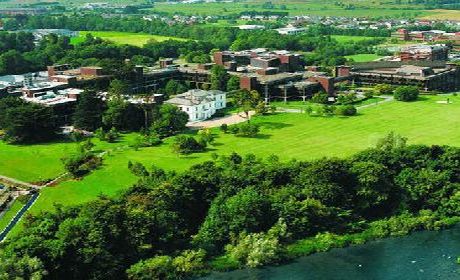BSc Aeronautical EngineeringAdd to shortlist
Engineering
Aerospace/Aeronautical
BSc Aeronautical Engineering
4 years
€3000 pa
Programme profile
If you like science, and its application to solve real world problems, then engineering may be for you. If you are also enticed by the thought of working in the exciting field of aeronautics, then you should almost certainly choose Aeronautical Engineering at UL.
The Aeronautical Engineering course at UL is your gateway into the hugely exciting aerospace industry. This elite course is one of the most respected in Europe, and is supported by outstanding facilities, including wind tunnels and composites manufacturing equipment. Right now job prospects have never been brighter for Aerospace Engineers, with a major shortage in Europe. More than 70% of UL graduates work in the Aerospace industry
The course is accredited by Engineers Ireland In 3rd year, top-performing students can spend a semester at the world-renowned Embry-Riddle Aeronautical University in Florida, USA, or at Georgia Institute of Technology in Atlanta, USA which is currently ranked in the top 5 US engineering schools.
Programme content
The first two years provide you with a foundation in the fundamental engineering disciplines, and subjects taught include:
Avionics
Air Transportation Management
Mathematics
Thermodynamics
Materials Science
Mechanics of Solids
Introduction to Engineering
Production Technology
Aerodynamics
Aircraft Maintenance
Engineering Mechanics
CAD (Computer Aided Design)
Fluid Mechanics
Electrical Engineering
Chemistry
An eight-month industry placement occurs at the end of year two. The University has links throughout the aviation industry, which has enabled students to be placed in prestigious aerospace companies such as Boeing and Airbus.
During the third and final years, all students study fundamental aeronautical engineering subjects such as:
Flight Mechanics
Aircraft Design
Aircraft Stability and Control
Aircraft Propulsion
Aircraft Structures
The flight mechanics module deserves special mention as the laboratory element of this course is conducted in-flight. A series of flight exercises are carried out over the course of a week, in a twin engine turbo-prop aircraft, in which students are provided with individual consoles for monitoring the aircraft’s performance.
A highlight of fourth year is the Aircraft Design module, run over two semesters, in which the students Design, Build and Fly a model aircraft that has to satisfy specifications set annually by the American Institute of Aeronautics and Astronautics (AIAA).
Progression
The university offers a MEng in Aeronautical Engineering
Entry Requirements
Students must present six subjects of which two must be at grade C or above at Advanced GCE (A-Level. The other subjects must be at least at grade C or above on GCSE or Advanced Subsidiary GCE (AS) papers. The six subjects must include: English, Mathematics and a language other than English. Maths A-Level required at Grade C or above.
460
No
No
No
05 November
01 May

 Join us on Facebook
Join us on Facebook